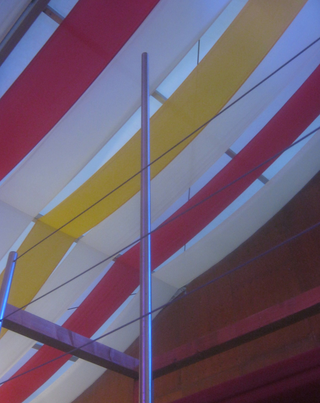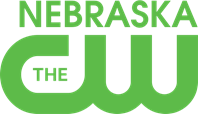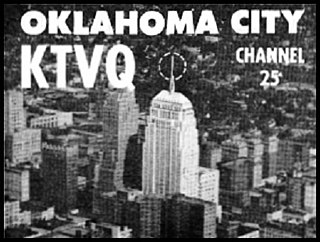Related Research Articles

Low-power broadcasting is broadcasting by a broadcast station at a low transmitter power output to a smaller service area than "full power" stations within the same region. It is often distinguished from "micropower broadcasting" and broadcast translators. LPAM, LPFM and LPTV are in various levels of use across the world, varying widely based on the laws and their enforcement.
A non-commercial educational station is a radio station or television station that does not accept on-air advertisements, as defined in the United States by the Federal Communications Commission (FCC) and was originally intended to offer educational programming as part, or whole, of its programming. NCE stations do not pay broadcast license fees for their non-profit uses of the radio spectrum. Stations which are almost always operated as NCE include public broadcasting, community radio, and college radio, as well as many religious broadcasting stations. Nearly all non-commercial radio stations derive their support from listener support, grants and endowments, such as the Corporation for Public Broadcasting (CPB) that distributes supporting funds provided by Congress to support public radio.
Iowa PBS, formerly Iowa Public Television (IPTV), is a network of Public Broadcasting Service (PBS) member stations in the U.S. state of Iowa. It is operated by the Iowa Public Broadcasting Board, an agency of the state education department which holds the licenses for all the PBS member stations in the state. Iowa PBS' headquarters are located at 6450 Corporate Drive in Johnston, Iowa, a suburb of Des Moines.

KALW (91.7 MHz) is an educational FM public radio station, licensed to the San Francisco Unified School District (SFUSD), which serves the San Francisco Bay Area. Its studios are located at Phillip and Sala Burton Academic High School off Mansell Avenue in San Francisco, and its transmitter tower is on Twin Peaks.
KERA is a non-commercial, listener-supported public radio station in Dallas, Texas. It is a member of National Public Radio (NPR). KERA 90.1 FM, KKXT 91.7 FM and KERA-TV 13, a PBS affiliate, are owned by North Texas Public Broadcasting, with studios on Harry Hines Boulevard in Dallas.
A broadcast license is a type of spectrum license granting the licensee permission to use a portion of the radio frequency spectrum in a given geographical area for broadcasting purposes. The licenses generally include restrictions, which vary from band to band.
KERA-TV is a PBS member television station licensed to Dallas, Texas, United States, serving the Dallas–Fort Worth Metroplex. Owned by North Texas Public Broadcasting, Inc., it is sister to NPR member station KERA, adult album alternative station KKXT, and classical music station WRR. The stations share studios on Harry Hines Boulevard; KERA-TV's transmitter is located in Cedar Hill, Texas.
KMTP-TV is an independent non-commercial educational television station licensed to San Francisco, California, United States, serving the San Francisco Bay Area. Owned by the Minority Television Project, the station maintains studios on Woodside Way in San Mateo. Its transmitter, shared with KCNS, KTNC-TV and KEMO-TV, is located atop Sutro Tower in San Francisco.

KOKH-TV is a television station in Oklahoma City, Oklahoma, United States, affiliated with the Fox network. It is owned by Sinclair Broadcast Group alongside independent station KOCB. The two stations share studios and transmitter facilities on East Wilshire Boulevard and 78th Street on the city's northeast side.

KNOP-TV is a television station in North Platte, Nebraska, United States, affiliated with NBC. It is owned by Gray Television alongside two low-power stations: CBS affiliate KNPL-LD and Class A Fox affiliate KIIT-CD. The three stations share studios on South Dewey Street in downtown North Platte; master control and some internal operations are based at the facilities of sister station KOLN on North 40th Street in Lincoln. KNOP-TV's transmitter is located at the site of its former studio on US Route 83 north of North Platte.
KACV-TV, branded on-air as Panhandle PBS, is a PBS member television station in Amarillo, Texas, United States. It is owned by Amarillo College alongside student-operated radio station KACV-FM (89.9). The two outlets share studios at the Gilvin Broadcast Center on Amarillo College's Washington Street campus ; KACV-TV's transmitter is located west of US 87–287 in unincorporated Potter County.

KFDA-TV is a television station in Amarillo, Texas, United States, affiliated with CBS. It is owned by Gray Television alongside Borger-licensed Telemundo affiliate KEYU. The two stations share studios on Broadway Drive in northern Amarillo, where KFDA's transmitter is also located.
WIUM is a 50,000-watt radio station licensed to Macomb, Illinois, in west-central Illinois. Western Illinois University is the station licensee, authorized by the Federal Communications Commission.

KNHL is a television station licensed to Hastings, Nebraska, United States, affiliated with The CW Plus. It is a full-power satellite of Lincoln-based KCWH-LD which is owned by Gray Television. As KHAS-TV, it formerly served as the NBC affiliate for the western side of the Lincoln–Hastings–Kearney market. KNHL is a sister station to NBC affiliate KSNB-TV in York and CBS affiliates KOLN/KGIN in Lincoln and Grand Island. KNHL's transmitter is located on US 281 north of Hastings.
KDYW was a non-commercial educational television station in Waco, Texas, United States. The station was owned by the Brazos Valley Broadcasting Foundation. As KCTF and KWBU-TV, it operated as a PBS member station for much of its on-air history, but was slated to be sold to Community Television Educators of Waco, Inc., a group associated with the Daystar Television Network, before surrendering its license.

KOZN is a sports station licensed to Bellevue, Nebraska, and serving the Omaha metropolitan area. It is owned by NRG Media, with studios at Dodge Street and 50th Avenue in Midtown Omaha. It airs a sports radio format.

WUVT-FM is a non-commercial FM radio station in Blacksburg, Virginia, serving Montgomery County, Virginia. It is licensed to Virginia Tech and is operated by The Educational Media Company at Virginia Tech. WUVT-FM is largely student-run and broadcasts a free form radio format. The radio studios and offices are located in Squires Student Center.
KKMR is a non-commercial FM radio station licensed to Arizona City, Arizona, and serving the Phoenix metropolitan area. It is owned by the Educational Media Foundation and it airs a Christian Contemporary radio format, as part of the K-Love network.

KTVQ was a television station in Oklahoma City, Oklahoma, United States, which operated from November 1, 1953, to December 15, 1955. The station was owned by the Republic Television and Radio Company. KTVQ's studios were located on Northwest 19th Street and North Classen Boulevard in northwest Oklahoma City's Mesta Park neighborhood, and its transmitter was located atop the First National Bank Building on North Robinson and Park avenues in downtown Oklahoma City.
KONZ was a non-commercial radio station licensed to Weatherford, Oklahoma, broadcasting a classic hits music format, consisting of pop hits of the 1960s through the 1980s. The station received its broadcast license on August 12, 2014, and was owned by the Better Public Broadcasting Association. The association surrendered the licenses for its stations, including KONZ, on September 11, 2018, and the Federal Communications Commission cancelled the licenses on September 14.
References
- ↑ FCC Record. The Commission. 2011. p. 9073.
- ↑ "No New Deals In FCC Database Thursday". AllAccess. 20 September 2018. Retrieved 20 September 2018.